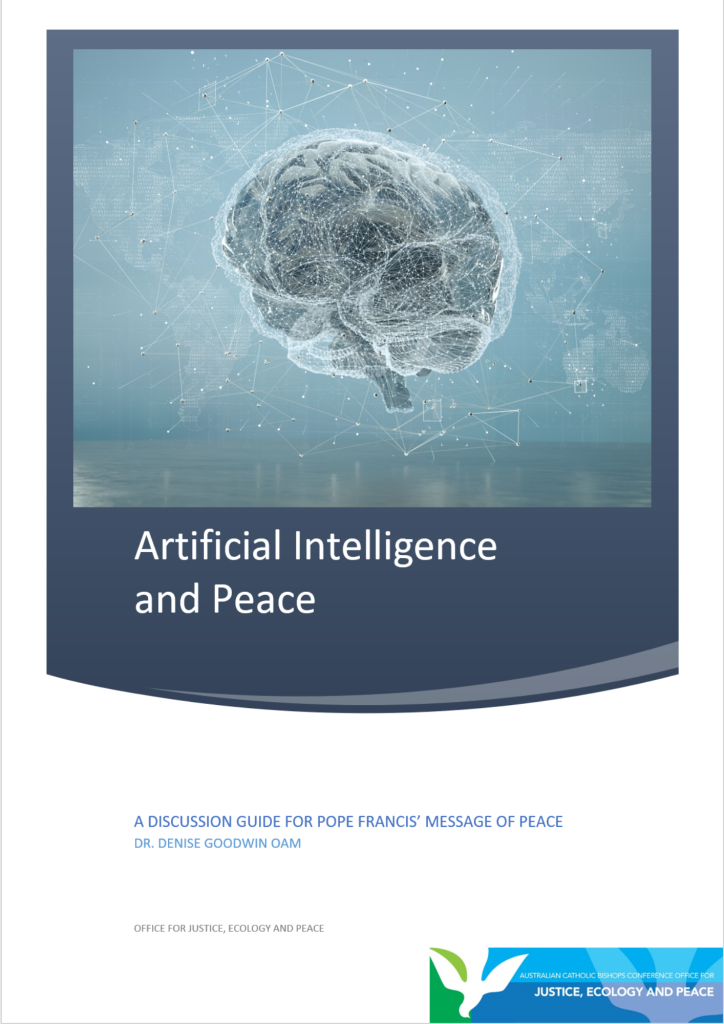The first of January each year is the World Day of Peace. On this day the Pope delivers a message to the world, this year on Artificial Intelligence and Peace.
To support this vital message, and encourage discussion of Pope Francis’ message, our office in conjunction with the Australian Catholic Social Justice Council has produced the following discussion guide:

Artificial Intelligence (AI) stands as a double-edged sword in the quest for global peace. On one hand, its potential as a tool for diplomacy, conflict resolution, and humanitarian aid is immense. On the other, the unchecked proliferation of AI poses significant dangers, echoing the concerns of Pope Francis regarding a technocratic paradigm. As we navigate this terrain, understanding both aspects is crucial for a harmonious future.
In recent years, we’ve witnessed how AI can be harnessed for peace-building efforts. Its ability to process vast amounts of data in real-time offers invaluable insights into conflict zones. For instance, organizations like the United Nations have used AI algorithms to analyse patterns of violence, predict potential outbreaks, and allocate resources accordingly. This proactive approach not only saves lives but also prevents conflicts from escalating.
Moreover, AI’s role in diplomacy is growing. From language translation services facilitating communication between nations to AI-powered simulations predicting the outcomes of policy decisions, the technology offers unprecedented avenues for fostering understanding and collaboration.
In humanitarian efforts, AI streamlines the delivery of aid by optimizing supply chains, identifying areas most in need, and even assisting in disaster response through predictive analytics. This efficiency ensures resources reach the affected populations swiftly, improving the efficacy of relief missions.
However, alongside these promises lie profound risks. Pope Francis has warned against a blind faith in technology, highlighting how the unchecked pursuit of AI can lead to ethical dilemmas and the erosion of human values. The dangers are multifaceted:
- Bias and Discrimination: AI systems are only as unbiased as the data they are trained on. Without careful curation, they can perpetuate existing biases, leading to discriminatory outcomes, especially in sensitive areas such as law enforcement or hiring practices.
- Autonomous Weapons: The development of fully autonomous weapons, driven by AI, raises serious concerns. The lack of human oversight in critical decisions of life and death poses a direct threat to global stability.
- Privacy and Surveillance: AI-powered surveillance technologies, if unregulated, can infringe on individual liberties, creating a dystopian reality where privacy becomes a luxury.
- Economic Disparity: The widespread adoption of AI could exacerbate economic inequalities, with marginalized communities bearing the brunt of job displacement and unequal access to technological advancements.
Pope Francis’ warnings of a technocratic paradigm in Laudato Si’ remind us of the urgent need for ethical considerations in AI development. As we harness its potential for peace, we must prioritize transparency, accountability, and human dignity.
Regulations and international agreements are crucial to ensure that AI serves humanity’s best interests. Ethical frameworks must be integrated into every stage of AI development, from data collection to deployment. Additionally, interdisciplinary dialogues involving policymakers, ethicists, technologists, and civil society are essential for shaping responsible AI governance.
